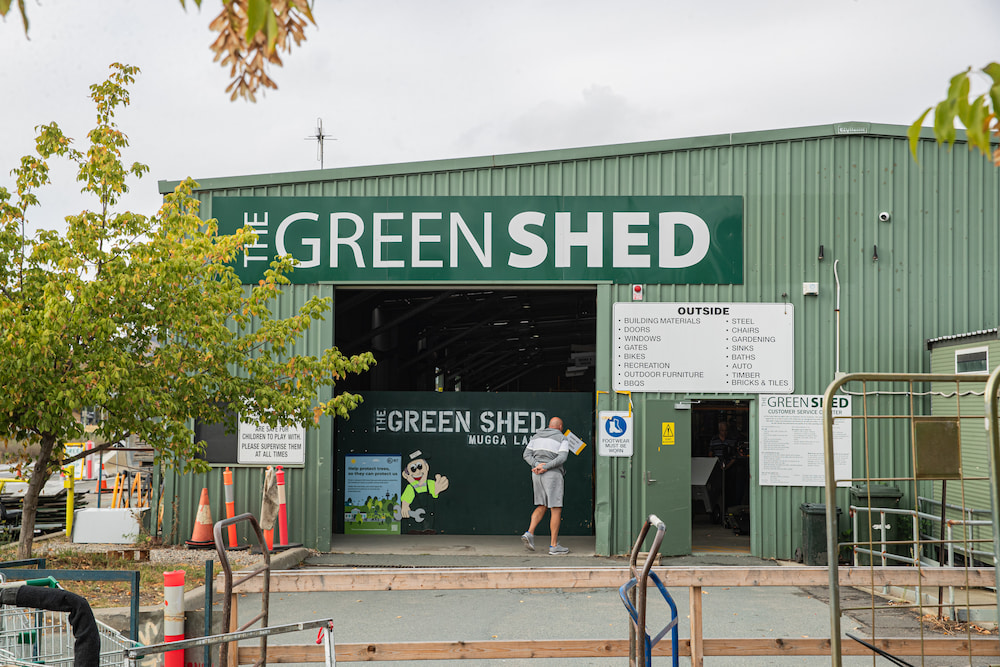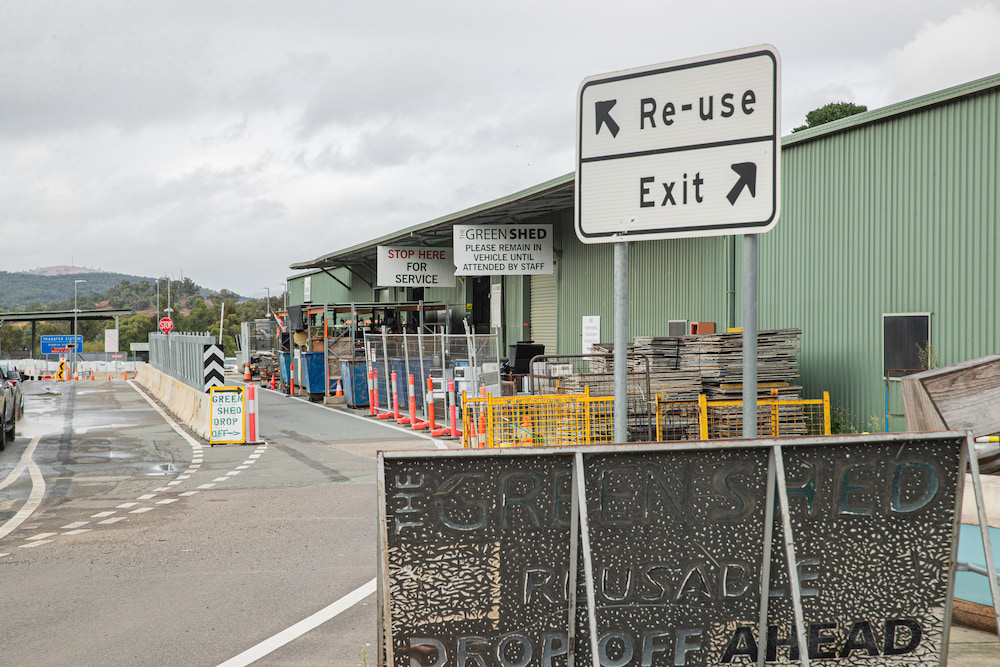At the end of May, St Vincent de Paul will take over the management of the Green Shed’s Mugga Lane and Mitchell reusable facilities, while the Green Shed’s stores in Civic will close.
“The shopping experience offered in the facilities will not replicate Vinnies shops or pricing,” a St Vincent de Paul spokesperson said. “The experience at the facilities will be the same experience Canberrans know and love now.”
But although Vinnies promises continuity and a “smooth transition”, many Canberrans are dismayed, and Green Shed staff dejected.
The Green Shed: the circular economy in practice
The Green Shed, “the first reuse centre in the world”, has been described as the circular economy in practice. It recovers 8,000 tonnes of waste a year, offsetting half the ACT’s carbon emissions from landfill. Its four sites hold a million items, almost everything imaginable except penny farthings, all selling within a week. Twenty thousand people visit each week. And it donates $10,000 to charities each month, totalling more than $2 million since 2010.
It was founded in 1988 as Revolve, to create jobs for unemployed people. Charlie Bigg-Wither and Sandie Parkes (who had been there at the beginning) secured the Mugga Lane contract in 2010 and the Mitchell contract in 2011. Under their stewardship, it became, locals said, “iconic”, “an integral part of the community, and a household name that every single person knew”.
Contract awarded to St Vincent de Paul
Last year, however, Transport Canberra and City Services held a competitive open tender process to manage and provide services at the Mugga Lane and Mitchell reusable facilities.
Procurement ACT announced that it had awarded the tender to St Vincent de Paul because it provided “best overall value for money”, and “met all the specified criteria to the greatest degree” (capability and capacity; managing reusables; circular economy support programs and social benefits; reporting and data plan; transition management; work health and safety; and creating local jobs).
The government said that the new contract would include competitive pricing in the reusable sector; employment opportunities for long-term unemployed; repair shops and tool libraries; improved data collection on the types and quality of donated materials; an education space for workshops, repair activities, and structured learning; and access to a wider range of items through Vinnies’ network of stores.
Vinnies also pledged to support the community through fundraising activities that promote a circular economy. Other not-for-profit, local community, and sporting organisations will be able to hold sausage sizzles and bake sales at the facilities. It will also run reusable-focused fundraising events, workshops by circular economy partners, and collect reusable items donated through night patrol vans and established programs.
“Both sites at the Mugga Lane and Mitchell Reusable Facilities will continue to support local charities in new and innovative ways into the future,” a spokesperson said.
Green Shed expected it would lose contract
Mr Bigg-Wither said he “had an inkling” that the Green Shed would lose the contract, but had expected it would go to Resource Recovery Australia, a national social enterprise that keeps waste out of landfill.
“They basically do what we do, but they’re not-for-profit,” Mr Bigg-Wither said. “We were prepared to go: ‘Yeah, that’s fine, no worries.’ And we still are. It’s just a big shock, because Vinnies is not in the waste industry. They’re a charity. They’re not a waste handler or a reuse handler, or any of those sorts of things. It was just completely out of the blue for us, and lots of other people, too.”
He remains, however, puzzled by the procurement.
“We’ve been on six-month, 12-month, 18-month extensions since 2015, since the first contract expired; we’ve basically been walking in the dark, because we never knew were we going to have a business six or 12 months down the track. But still we’ve invested money, still employed more people, still done all this sort of stuff, not even knowing whether we’d have a business or not.
“I think it’s funny how on one side, [the procurement decision] can be one way, and then on the other side, you can’t advertise a tender for 12 or 14 years. That’s bizarre to us, the way the system works… Our ACT contract managers have been great; we’ve never had any issues with them. But I think the whole system’s a bit broken.”
Canberrans protest: 6,500+ sign petition
The ACT Government states: “The service offered by Vinnies will be very similar to the Green Shed, with additional enhancements added over time to get more of the community involved.”
But it may be difficult to convince the community that the change of management was a good idea.
Upset that the Green Shed had lost its contract, Zak Finnemore started a Change.org petition on Wednesday evening to prevent the closure.
He did not expect much to come of it; he wrote it in two minutes, on the way to an event, using ChatGPT prompts, but he wanted there to be a petition to sign.
“I thought no-one would really care,” he said.
But people did care. Within 24 hours, more than 5,000 people had signed the petition; so far, it has more than 6,500 signatures.
“Everyone I’ve spoken to about this was absolutely devastated,” Mr Finnemore said. “I haven’t met a single person … who wasn’t upset about the closure of the Green Shed and the handover to Vinnies.”

Social media platforms like Facebook and Reddit erupted. Canberrans object to a national organisation (and, for some, a Catholic one at that, albeit a lay organisation that runs separately from the church) taking over from a local business. They worry that the Green Shed’s staff (some of them disabled) will lose their jobs, and be replaced with volunteers. They expect that Vinnies will accept fewer goods, meaning more items end up in landfill; and that the price of items will increase dramatically, depriving thrifty shoppers, poorer Canberrans, and students of access to affordable clothing and furniture, or simply rare and unusual items.
“I’ve been going there since I was a little kid, basically, with my dad,” Mr Finnemore said. “There’s lots of stuff there that you can’t get anywhere else, like tape machines, vintage electronica, furniture that would otherwise just be thrown away or that most people have no use for. They’ve always taken it in…
“The people working there have always been very friendly. It’s community driven… Even if Vinnies does take over, and they do a seamless transition, people are probably still going to lose their jobs; and you could see price gouging on those items in there. As well, the local community … would no longer be running it; it would be a national organisation.”
ACT politicians want answers
Politicians, too, have entered the fray. Canberra Liberals leader Elizabeth Lee, noting that many Canberrans were “devastated by this news”, wrote to the relevant minister asking for an explanation.
“Some ACT government procurement decisions have not been in the best interests of Canberrans, and it is right for the community to be asking questions about this decision,” she said.
Likewise, ACT Greens MLA Jo Clay had sought a briefing on the decision.
“I was so sad to hear this news,” she said. “I know the industry and the Green Shed well as a customer, a recycler, and as someone who used to work in the industry. I’m very aware of what they’ve done for our local community and for our recycling rates. It’s also a real shame that this decision will mean the closure of their city shopfronts…
“The Green Shed has done a huge amount to support charities, community groups and artists, as well as building the operation up into a fantastic organisation that recycled and upcycled a huge amount of material. It’s clear from the huge community response that they will be missed…
“I also wish the new operator all the best, and hope that they can provide as much recycling and community benefit as the Green Shed has provided.”
Mr Bigg-Wither said the Green Shed was “absolutely blown away” by the public’s support. “None of this has been driven by us; we’re not anti-Vinnies. It’s a contract; it always was a contract; it’s not forever… We’re not pushing to have the decision overturned or anything like that, because obviously that would never happen anyway.”
A St Vincent de Paul spokesperson said: “We respect and appreciate the strong passions people feel about the reusable facilities and the vital rôle it plays in the community. The things people love about donating and shopping at the two locations will not change.”
What will change under Vinnies?
Vinnies has said it would accept all donations previously accepted by the Green Shed, including furniture, electrical equipment, clothes, building materials, and tools.
It has also promised to maintain Green Shed’s model of providing paid employment for some of Canberra’s most vulnerable people, including all the necessary training and support. It will offer current staff the opportunity to keep working at facilities as part of the new St Vincent de Paul team.
“All those who wish to work with us will be able to do so,” a spokesperson said.
Nevertheless, morale is not good, Charlie Bigg-Wither said. Several staff, including manager Austin D’Alessandro, will refuse Vinnies’ job offer.
“People know that they’re not going to have a job after two and a half months,” Mr Bigg-Wither said. “There’s not really a lot to work towards at the moment.”
He considers Vinnies’ statement that “it’s going to be the same job and it’s going to be run the same way, etc., etc.” to be misinformation.
“The reality is they’ve given us a leaflet, which we’ve given to all our staff, with a QR code on it. And if they wish to apply for a position, then they’re welcome to: there are no guarantees, no promises.”
Green Shed must be empty
The Green Shed’s contract ends on 30 May, and Vinnies takes over the next day, 31 May. The Green Shed will need to get rid of all its stock.
“The shed needs to be empty,” Mr Bigg-Wither said. “We will sell what we can; we’ll probably have to not accept material in the last few days, the last week, because obviously we can’t sell it, we physically don’t have time to get rid of it…
“We’ll leave the key under the doormat, and then it’s their [Vinnies’] facility to run after that.
“If they’re good, people will support them; if not, as Canberrans are very good at doing, they will turn their noses up at them, and they won’t do well at all.”
Mr Bigg-Wither said he would not speculate on whether Vinnies would maintain what the Green Shed had done.
“We built this business from nothing over the last 14 years, so I hope they can,” he said. “They don’t have experience in the reuse industry like we do. We’ve been doing it for 30 years, since Revolve back in 1988, so we know it in and out. But good luck to them; we have no beef with Vinnies.”
‘A real privilege’
Mr Bigg-Wither finished by thanking the public for its support.
“The Green Shed is a community… We’ve been able to do amazing things – and that’s only with the help of the Canberra community donating their items to us. Without goodwill from the public, we would have never had a business. We would just like to thank everybody really, because it’s been an amazing journey to be in a position where you can help whoever you want to help, and not have to go through boards, or to have management decisions.
“If somebody comes in and they need some furniture because they’ve just been kicked out of home, or are a refugee, or they’ve just run away from domestic violence or whatever it is, we can just say take whatever you want. To be in that position is a real privilege.”


